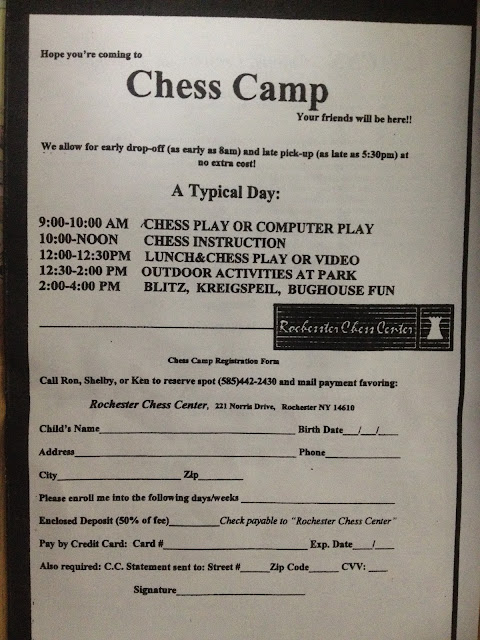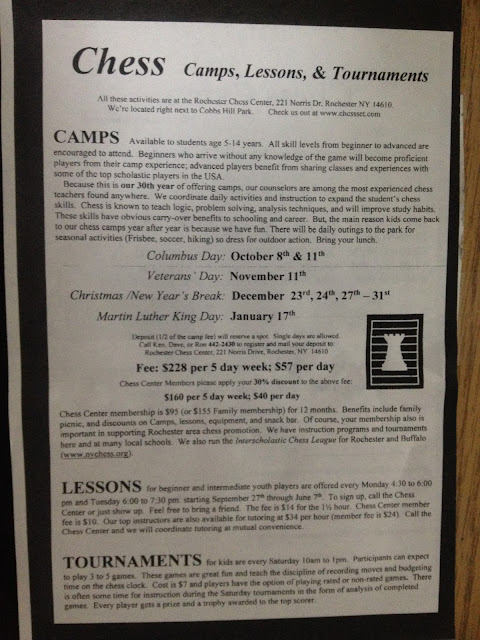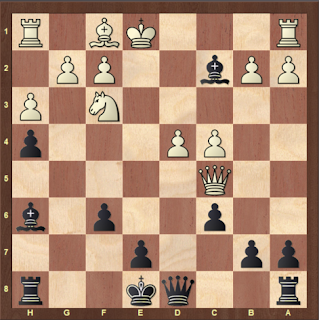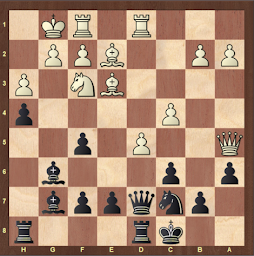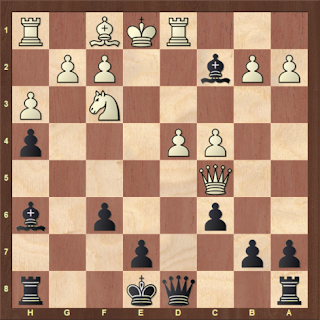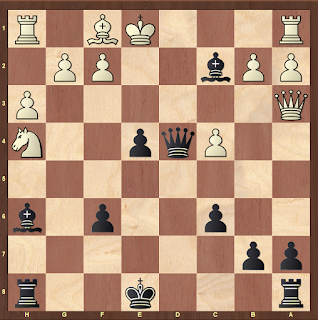** Schedule Change ** The Rawle Farley Memorial Monday Night Chess League
The start date for the league has changed from January 3rd to Monday January 10th, 2022. You can register now through January 10th at the Rochester Chess Center or call 585-442-2430. For entries on 1/10/22 when games begin, please register no later than 6:30pm so we can form the teams.
Rochester Chess Center Chess Camp for the Holidays!
Sign-Up for CHESS CAMP!
Because this is our 30th year of offering camps, our counselors are among the most experienced chess teachers found anywhere. We coordinate daily activities and instruction to expand the students' chess skills. Chess is known to teach logic, problem solving, analysis techniques, and will improve study habits. These skills will carry over to school and career. But the main reason kids come back is. . . We have fun!!
Martin Luther King Day: January 17th
Register at the Rochester Chess Center or call 585-442-2430.
+The Rawle Farley Memorial Monday Night Chess League: The start date for the league has changed from January 3rd to Monday January 10th, 2022. You can register now through January 10th at the Rochester Chess Center or call 585-442-2430. For entries on 1/10/22 when games begin, please register no later than 6:30pm so we can form the teams.
+ The 42nd Annual Marchand Open: Web Link: 42nd Annual Marchand Open | US Chess.org
Summary: Heritage Event, Enhanced Grand Prix, Junior Grand Prix. Bill Gray's Regional Iceplex (on the MCC Campus). Saturday, April 9, 2022 - Sunday, April 10, 2022. EVENT OVERVIEW. US CHESS GRAND PRIX POINTS: 150 (ENHANCED)Dr. Erich Marchand requested that his "friends play chess in his memory". 5SS, G/120 d5. Location: Bill Gray's Regional Iceplex (on the MCC Campus), 2700 Brighton Henrietta Town Line Rd., Rochester, NY 14623. $17,000 Gtd. Open Section: $3000-2000-1300-800-500-300. Under2200 & U2000 each $800-475-280. EF: $90. U1800 Section: $1050-700-400. Under 1600 $700-400. EF: $75. U1400 Section: $580-360-240. Under 1200 $340-220. EF $65. U1000 Section: $350-220-140. Under 800 $175-115. EF: $55. Unrated players in the U1800 section can only win $330, in U1400 $195 & U1000 $100. No limit in Open. Balance to next prize winners. Free EF (deducted from prize) and $100 appearance award to all GM and IM if entered by 3/20. All EF add $20 after 3/20. All sections USCF rated. Ratings as in April Supplement. Bring sets, boards, and clocks – none provided. Food court and chess books & equipment sales available on-site. No smoking allowed in the Iceplex. Reg.: 8:30-9:15am. Rds.: Sat. 10-2:15-6:30, Sun. 10-2:15. One 1/2 point bye available in round 1, 2, 3, or 4 if requested at entry. Optional first round Friday, 4/8 at 7pm played at Rochester Chess Center (register by 6:30pm). Info: 585-442-2430. Mail entry to: Rochester Chess Center, 221 Norris Dr., Rochester, NY 14610. Email entry to: chesscenter@rochester.rr.com. Web: nychess.org. Store Website: chessset.com. Address: 2700 Brighton Henrietta Town Line Rd. Rochester, NY 14623 United States. Sections: 4 Grand Prix Points: 150 Prize Fund: $17,000. ORGANIZER: Ronald Lohrman. Email: chesscenter@rochester.rr.com Phone: 585-442-2430 Website: Zttp://www.nychess.org
Web Link: Online Registration for Chess Championships (chessaction.com)
Niagara Falls Open Tournament Results
A large contingent of Rochester New York players participated in the 1st annual Niagara Falls Open Tournament held at the Sheraton Hotel in Niagara Falls, NY on the weekend of Nov. 19-21, 2021. Here is the cross table Link: The United States Chess Federation - Player/Rating Lookup (Old format) (uschess.org)
A summary of results of Rochester players in the Niagara Falls Open will be posted soon.
Middlegame Masterclass From Zero to Master
Our club's National Master Matt Slomski has created a wonderful online class which can help you climb the ratings ladder to Master! Through December 31, 2021, you can get lifetime access to the course for $30 (regularly $90). Click the picture below to visit the page.
CCCR's 25th Annual Championship Results
Twenty-Eight members of the club participated in this year's annual Community Chess Club of Rochester championship tournament. The annual club championship consists of four rounds of games played over four separate Wednesday nights (Oct. 6, 13, 20 and 27), with a Swiss G/80;d5 time control. This is the second largest annual chess tournament in Rochester (with the largest being the Marchand Open). The highest rated player was 2015 club champion Clif Kharroubi (USCF 2130) followed by Toby Rizzo (USCF 2129). The range of USCF ratings among the club members was between 570 and 2130. Our club president Don Stubblebine who was also a club champion in 2010 also participated in the tournament. The tournament was directed by Chief TD Ron Lohrman of the Rochester Chess Center. The assistant TDs were Mike Lionti and Ken McBride. The organizer was Mike Lionti.
In the final round this year, the same two chess players who played against each other last year played against each other again this year. The outcome last year (2020) between Henry Swing and David Phelps was a draw, and David won 1st place by tie-break with Henry placing 2nd. This year, David won the final round game resulting in a final score of 4 points, which was the only 4-point score in the tournament. David Phelps now has 2 championships under his belt. Following two-time Club Champion David Phelps, we have Toby Rizzo in 2nd Place, Henry Swing in 3rd Place and Dale Janezic in 4th Place. For the Section prizes, we have U1800 winner Oliver Valenti, U1500 Keshil Bilimoria, U1200 winner Howard Decker and U1000 winner Kaleb Holton. Awards night was celebrated with a cake and other desserts on Nov. 10, 2021.
CCCR Championship Hall of Fame: David Phelps (2021-2020). Lev Paciorkowski (2019-2016). Clif Kharroubi (2015). Webster Kehoe (2014). Abraham Glasser (2013-2012). Doug Spencer (2011). Don Stubblebine (2010). Isay Golyak (2009, 2006-2005, 2000-1999). Igor Nikolayev (2003-2001). Matt Parry (2008). Craig LaSalle (2007). Andrey Kozitsky (2004). Jim Clague (1998). Mike Winans (1997).
The online cross table can be found at this link: US Chess MSA - Cross Table for 25TH ANNUAL CLUB CHAMPIONSHIP (Event 202110277902)
More content will be added for this article.
Games: Coming Soon
Photo Gallery: Coming Soon
Cross Table
Updates in-progress... Check back soon for more information.

